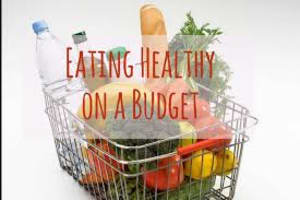
5 Ways to Eat Healthy on a Budget
Maintaining a healthy eating routine takes hard work, commitment and investment- both time and money. It is true that ordering fresh produce and lean protein will most likely hit your wallet harder than a Big Mac will. However, there are ways to make healthier choices in your every day life without taking out a loan.
Where you buy your groceries is a huge contributor to the monthly food bill. Grocery stores like Whole Foods, Farmboy, and Sobeys tend to be on the higher end of the spectrum. No Frills, Metro and Loblaws/Superstore are a few of the less expensive locations. You could also sign up for a points system, which allows you to redeem the points for money once a certain amount has already been spent. For example, Loblaws/Superstore has PC plus points. Once you earn 20 000 points (this can accumulate very quickly with a hungry household), you receive $20 to spend in store = free groceries!
Also keep in mind discount days and coupons! Some stores offer student and senior discounts on certain days. Flyers, online/email offers and coupons can save you more than you think, without too much effort.
Certified organic food has taken the health conscious population by storm. Although it ensures food is produced without added methods (ex. genetic engineering, radiation or sludge sewage), this does not mean that it is nutritionally superior. Due to the limited food supply and the increased costs of production and post-harvest handling, organic foods are much more expensive than their counterparts. It is an entirely personal opinion and preference to whether or not you want to purchase and consume organic produce, but keep in mind that most foods will have very similar nutrition profiles regardless of if they are certified or not.
Depending on the seasoning, brand and added ingredients, some frozen and canned foods can be just as healthy and often more affordable. These products are harvested and packaged at the height of their season, so the nutrients are comparable to what you would buy fresh. Of course, there may be a difference in taste, but if you are looking for a good bang for your buck- try out this method! It is also a good approach to take when you want to avoid fresh fruits and vegetables from going bad. A bag of peas, carrots and beans can last a few months in the freezer and is an easy go-to when you just don’t have the time to prepare anything extravagant.
*Be aware of the sodium content in some canned vegetables, as salt is used as a preservative. Rinsing the food before consuming it will eliminate a good chuck of this salt.
Buying fruits and vegetables that are in season is a great way to save on the grocery bill. Take a look at the link below for a list of produce that is in season in Ontario each month.
http://ontariofarmfresh.com/consumers/whats-in-season/
Not only does this make your budget go further, it also supports local farmers and organizations. For those months that your favourite foods are not in season, think ahead, buy extra and freeze them when they are. For example, do you love fresh peaches and miss them once winter rolls around? Buy a few bushels while they are available. Wash, prepare and store them in the freezer or in cans to use later in the year. Add them to smoothies, as a topping on yogurt with granola, in oatmeal or as part of a dessert recipe.
Does meal prepping and having your whole week of dinners organized ahead of time sound like a far-fetched fantasy? It is not as daunting as you may think! If you want to feel prepared, save money and eat healthier, give this a try this week.
- Set aside just 30 minutes of your Sunday night to sit down and come up with a plan.
- Write down some of your favourite meals that you want to prepare for the upcoming days. Make sure you have something for every night (and yes, leftovers can be included too!).
- Once you have your meals picked out, think about the ingredients you need for each meal. It is more than likely that multiple dishes will have the same or similar ingredients.
- Use this meal planner as a grocery list and drastically reduce your time spent wandering around the store.
By planning your weeknight dinners ahead of time, you will save time at the store, feel less stressed about what to make again, and save money! Having a strict idea of what ingredients go into the meal will allow you to buy more accurate amounts and stay away from those moments of buying whatever you can find 30 minutes before dinner should be on the table.
If some of these tricks sound like they take more effort than you are willing to put in, just take it one step at a time. Once you master one, you can incorporate another into your routine. Eventually, you will be on your way to a more organized, cheaper and healthy way of eating!
If you have any questions about this article or want to speak with Ashlen directly, email her at leonard.ashlen@gmail.com.
Ashlen Leonard, RD

I would highly recommended Eric and Team Triumph!
Ian Ross

A year ago I could only tread water and had not run since childhood. With the amazing Virtual Olympic course, support, guidance, and tips from of all the folks at Team Triumph I've ended the season with my first Olympic distance triathlon under my belt and am hooked! Really looking forward to the 2025 season and even to the hard work over the winter to prepare. Karen Houle

I wanted to let you know that the Perth triathlon was a great experience, I somehow placed third in my age group! What a supportive group of participants (including Team Triumph athletes), cheering bystanders and volunteers.
Thanks to your swim lessons, I learned the technical basics and gained confidence to get back in the pool after decades. And it was really special doing this with Ann Laidlaw, my bestie for many years. We did a couple of additional swims with Kevin and Team Triumph people, also a great way to continue learning and practicing good technical form.
I will continue with lane swimming and who knows, maybe there's another triathlon in my future!